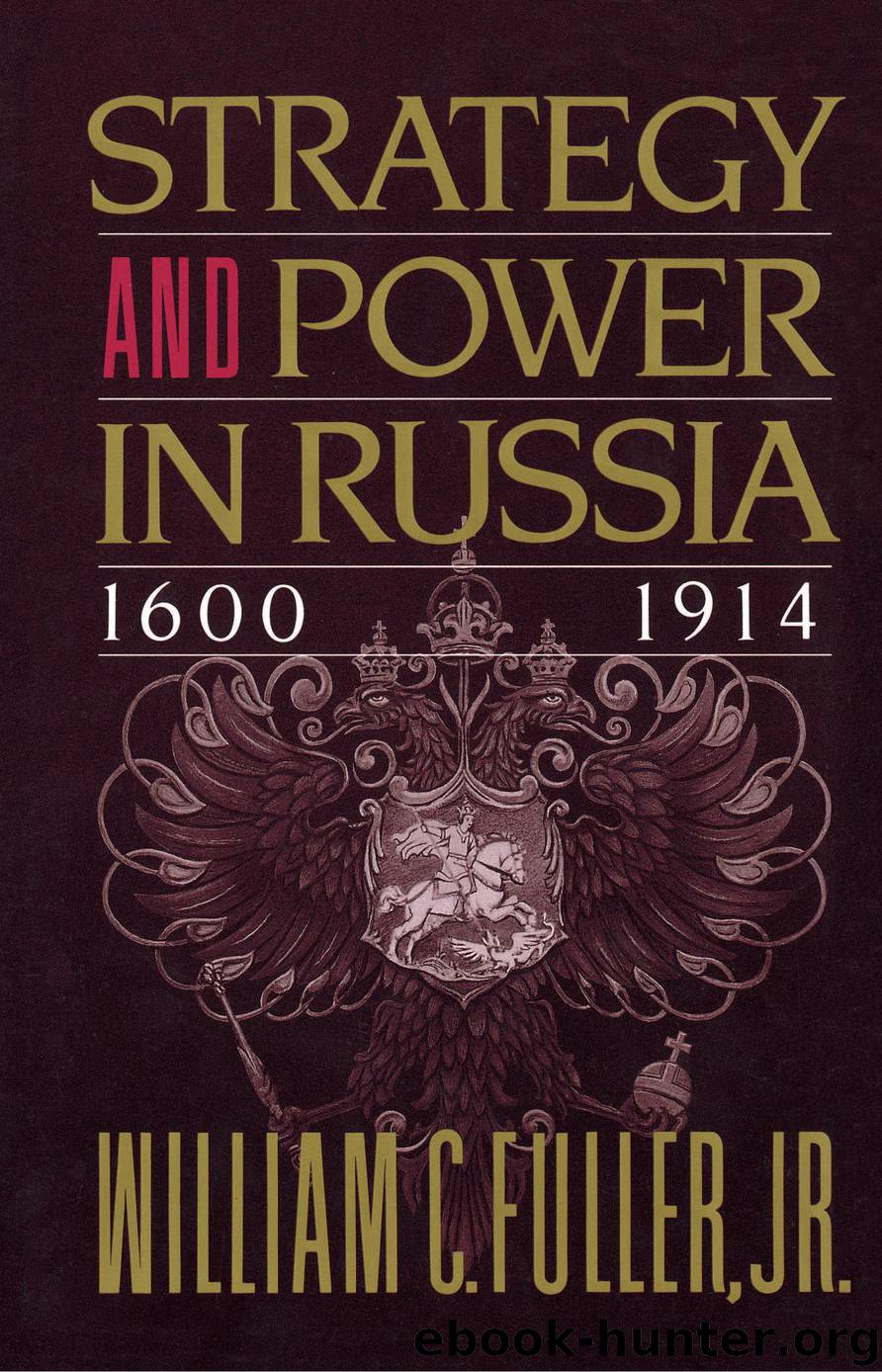Strategy and Power in Russia 1600-1914 by William C. Fuller

Author:William C. Fuller
Format: epub
Publisher: Free Press
Published: 2017-04-30T04:00:00+00:00
Military Strategy Under Alexander II
The military and naval reforms of the 1860s and 1870s were impressive achievements, but in the end they would not have been worth much had not the Ministries of War and Marine also tried to integrate them into coherent and realistic strategies. Although ambitious strategies may be valueless without the forces to implement them, it is equally true that neither advanced weaponry nor numerous and well-trained armies can compensate for the absence of plans for the effective use of military force to fulfill prescribed political ends. It is to the credit of the reformers at the Ministries of War and Marine that they understood this and took pains to reexamine Russian strategy even as they purchased munitions, overhauled their bureaucracies, and developed a new system of conscription.
The navy’s problems were less complex than the army’s. One of Konstantin Nikolaevich’s first acts upon taking office as Minister of Marine had been to order an extensive study of the following question: “What in general is the goal and the purpose of the fleet in Russia, and what as a result ought to be its size and composition?”57 It was obvious that there were certain a priori constraints on the way in which the question could be answered. Russia traditionally was not a maritime power; it possessed neither a large seaborne commerce nor any distant colonies that had to be defended by a strong oceangoing fleet. Then, too, there were geographical limits on the ways in which Russia could employ the naval power it possessed. The Paris Peace severely restricted the number of warships Russia could legally maintain on the Black Sea.I Even had Russia been allowed to rebuild a large Black Sea fleet, Turkey could at any time deny it access to the Mediterranean by simply closing the straits. Russia’s Scandinavian and German neighbors could imprison the Baltic Fleet in the same manner by shutting down the Sound. The Caspian was, of course, an inland sea, while Russian ships in the White Sea and the Pacific had to operate out of ports that were icebound for much of the year. It followed that Russia could not count on concentrating its naval assets in one place in the event of crisis or war. Barring exceptional circumstances, each of its fleets and flotillas had to operate on its own, without help from any of the others. That meant it was hopeless for Russia to try to match France or Britain—the two first-rank naval powers of that time—in a naval competition. Russia’s maritime forces were permanently divided. By contrast, France and Britain (either singly or together) could unite their fleets, and by choosing the time and place of the attack could invariably assure themselves of naval superiority over Russia. In view of all of this, Konstantin concluded “that our fleet ought to be such that we will always be stronger than our weak neighbors, and such that the first-time naval powers, in the event of a war between them, will prize
Download
This site does not store any files on its server. We only index and link to content provided by other sites. Please contact the content providers to delete copyright contents if any and email us, we'll remove relevant links or contents immediately.
| Africa | Americas |
| Arctic & Antarctica | Asia |
| Australia & Oceania | Europe |
| Middle East | Russia |
| United States | World |
| Ancient Civilizations | Military |
| Historical Study & Educational Resources |
Red Famine: Stalin's War on Ukraine by Anne Applebaum(2927)
Midnight in Chernobyl by Adam Higginbotham(2541)
Chernobyl by Serhii Plokhy(2534)
Midnight in Chernobyl: The Untold Story of the World's Greatest Nuclear Disaster by Adam Higginbotham(2220)
Red Shambhala by Andrei Znamenski(2193)
The House of Government by Slezkine Yuri(2191)
The Gulag Archipelago (Vintage Classics) by Aleksandr Solzhenitsyn(2095)
Red Notice by Bill Browder(2070)
All the Kremlin's Men by Mikhail Zygar(2064)
From Cold War to Hot Peace by Michael McFaul(2029)
Putin's Labyrinth(2016)
From Russia with Lunch by David Smiedt(1971)
The Future Is History by Masha Gessen(1904)
A People's Tragedy by Orlando Figes(1863)
The Romanovs by Simon Sebag Montefiore(1820)
How to Tame a Fox (and Build a Dog): Visionary Scientists and a Siberian Tale of Jump-Started Evolution by Lee Alan Dugatkin & Lyudmila Trut(1760)
The Lost Spy by Andrew Meier(1745)
Putin's Labyrinth: Spies, Murder, and the Dark Heart of the New Russia(1741)
Art and Revolution by John Berger(1721)
